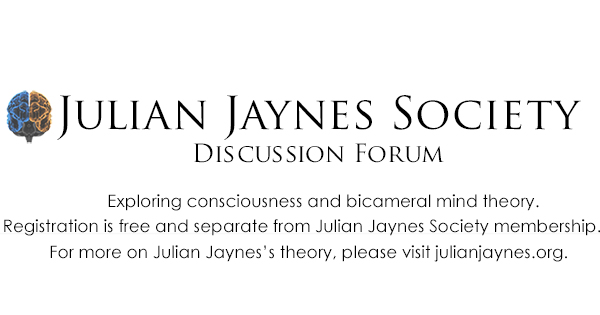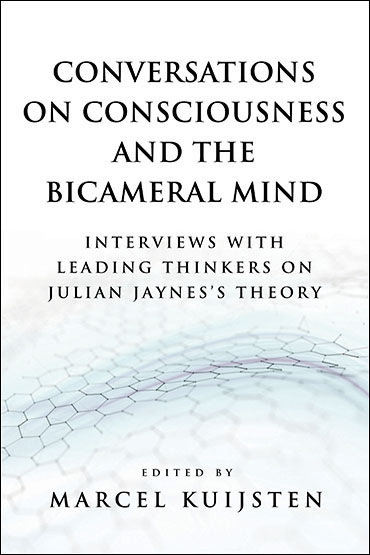Sensed Presences as “Perceptionless Hallucinations”:
The Invisible Company of “Supernatural Beings” in the Ancient World May Be Overlooked
At the margins of mainstream psychology stand a family of anomalous experiences, e.g., spirit possession, hypnosis, prophetic frenzy, imaginary playmates, out-of-body experiences. Establishment psychology mostly ignores these atypical phenomena and chooses to explain the low-hanging fruit of the “average, ordinary, and normal” (what is “abnormal” is understood simply as the psychic machinery breaking down rather than as instances of cognitive relativism). Arguably, it might be more productive to explain first odd behaviors and then research our way toward a more theoretically robust account of psyche. Consider the “sense of presence” from a Jaynesian perspective.
Sensed presence describes how an individual has a strong feeling of the existence of another person (sometimes recognized, sometimes not, sometimes supernatural) without any apparently corresponding sensory stimulus. William James described this experience as a "belief in the reality of its object quite as strong as any direct sensation ever gives. And yet no sensation seems to be connected with it at all ... The phenomenon would seem to be due to a pure conception becoming saturated with the sort of stinging urgency which ordinarily only sensations bring" (Principles of Psychology, Volume II, pp. 322–323, 1890). The feeling of presence often occurs during periods of bereavement, when confronted with a crisis, or in moments of great stress or fatigue. Many have reported incidents when an unseen entity, such as a spirit, provides advice, comfort, or support during traumatic experiences (in some situations, the presence manifests itself in visible form). The entity is experienced as located in external physical space and is more than an illusion or the product of an over-active imagination.
A hallucination can be defined as a perceptual experience that: (1) transpires without appropriate stimulus; (2) convinces the experient that what is perceived is real; and (3) is not amenable to voluntary control by the experient. Felt presence meets the criteria of the latter two, so it can be described as a type of hallucination minus sensory experiences. Hallucinations are typically associated with audition and vision (though they can occur, less commonly, in other sensory modalities). An invisible presence, like mental imagery, is quasi-hallucinatory or hallucinoid (my contention is that traces of bicameral hallucinatory-ability define mental imagery; in other words, introception is a descendant of preconscious hallucinations).
We associate bicameral hallucinations with supernatural visitations of gods, who admonish, command, or warn someone. These theophanic encounters could be perception-rich, taking the form of thunderous, booming voices and vivid, psychedelic visions (the biblical accounts of Isaiah and Ezekiel are good examples). But we need to entertain the notion that in preconscious times people also experienced a more subtle, less dramatic type of hallucination that we would describe as “felt” or an “invisible presence.” Claiming that sensed presences were common in the distant past is admittedly speculative and requires more evidence. But if true, it means ancient people were hallucinating a lot more than the archaeological and historical record might suggest. Conscious people do not see the need to constantly comment on the marvelous manner in which their mind’s eye witnesses a parade of mental images marching across our private psychoscapes. In the same way, perhaps preconscious individuals thought it unnecessary to always recount feeling the company of ancestors, guardian angels, personal gods, and assorted numina.
Sensed Presences as “Perceptionless Hallucinations”: The Invisible Company of “Supernatural Beings” in the Ancient World
Posts by anthropologist, mental health counselor, and author Brian J. McVeigh on Julian Jaynes's theory and related topics.
Return to “Brian J. McVeigh's Random Thoughts”
Jump to
- JJS Forum
- ↳ General Discussion
- ↳ News Items Related to Jaynes's Theory
- ↳ Book Discussion: The Origin of Consciousness and Julian Jaynes Society Publications
- ↳ Myths, Misconceptions, and Fact Checks About Julian Jaynes's Theory
- ↳ Brian J. McVeigh's Random Thoughts
- ↳ Julian Jaynes
- ↳ Conferences, Events, and Local Discussion Groups
- ↳ Lecture Discussion
- ↳ Interview and Q&A Discussion
- ↳ 1.0. Hypothesis One: Consciousness Based On Language
- ↳ 1.01. Hypothesis One: Consciousness Based On Language | Subtopic: Consciousness & Dreams
- ↳ 1.02. Hypothesis One: Consciousness Based On Language | Subtopic: Consciousness in Children
- ↳ 1.03. Hypothesis One: Consciousness Based On Language | Subtopic: Consciousness and AI
- ↳ 2.0. Hypothesis Two: The Bicameral Mind
- ↳ 2.1. Hypothesis Two: The Bicameral Mind | Subtopic: Auditory Hallucinations in Normal Adults
- ↳ 2.2. Hypothesis Two: The Bicameral Mind | Subtopic: Hallucinations & Imaginary Companions in Children
- ↳ 2.3. Hypothesis Two: The Bicameral Mind | Subtopic: Hypnosis, Possession & Altered States of Consciousness
- ↳ 2.4. Hypothesis Two: The Bicameral Mind | Subtopic: Religion & the Bicameral Mind
- ↳ 2.5. Hypothesis Two: The Bicameral Mind | Subtopic: Schizophrenia
- ↳ 2.6. Hypothesis Two: The Bicameral Mind | Subtopic: The Mentality of Pre-Literate & Pre-Modern Peoples
- ↳ 3.0. Hypothesis Three: Dating the Development of Consciousness
- ↳ 4.0. Hypothesis Four: Jaynes's Neurological Model for the Bicameral Mind
- ↳ The Bicameral Mind in Fiction, Film & Popular Culture
- ↳ Information for Students


